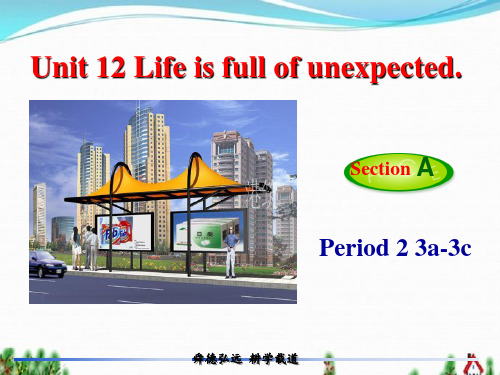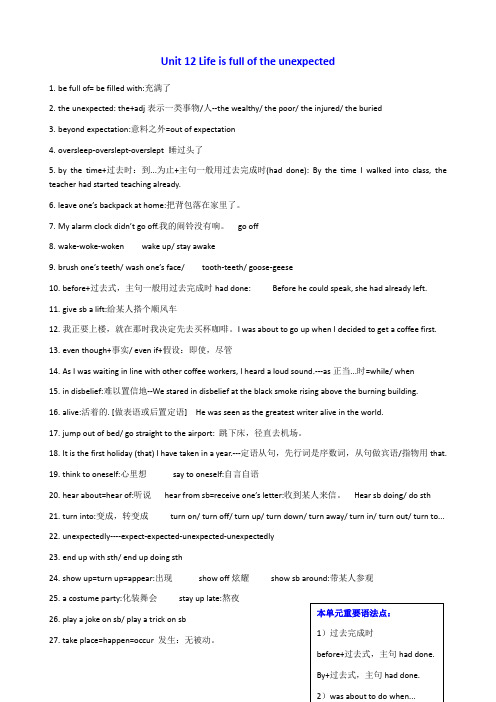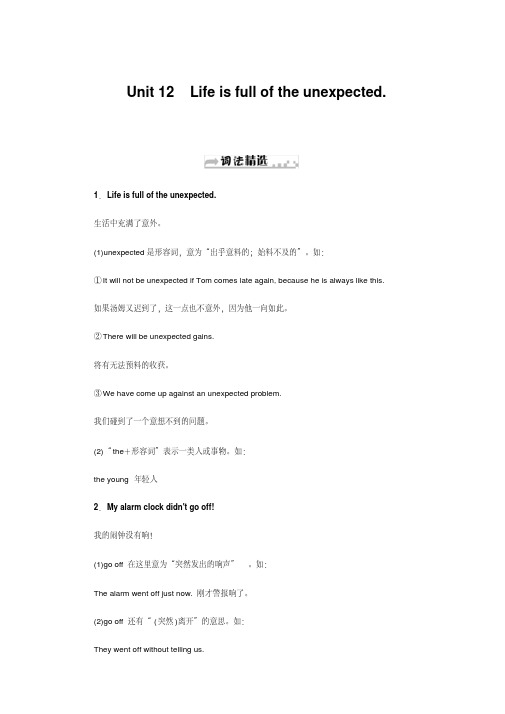Unit 12 Life is full of the unexpected.全单元课件
人教版九年级英语Unit12 Life is full of the unexpected 知识清单

Unit 12 Life is full of the unexpected.知识清单一、词性变化1、be full of = be filled with 充满full adj.满的;饱的fill...with 用...充满2、unexpected adj.想不到的;意外的the unexpected 意外事件unexpectedly adv.意外地unexpectedness n.出乎意外,突然expect v.期望;盼望expected adj.预期的expectedly adv.预期地expectation n.期待;期望expect to do sth 期待做某事3、Take a shower 洗淋浴4、by the time 在...以前;从句用一般过去时,主句用过去完成时By the time I came in , Tom had written his name on the blackboard .5、Oversleep v.睡过头oversleep-overslept-oversleptoverage 超龄的oversized 过大的overwork 过度劳累overcoat 长大衣overweight 超重的6、Leave v.遗忘;留下;离开;/n.假期;休假leave-left-left-leavingleave sp 离开某地leave A for B 离开A地前往B地leave for sp 动身前往某地leave sb alone=leave sb by oneself 把某人单独留下ask for a three-day leave 请三天假7、Ring v.响;给...打电话;/n.戒指ring-rang-rung-ringing8、go off 响;变坏,变质;熄灭;下降9、put on 增加;穿上;戴上;上演;播放10、rush out of 冲出...11、luck n.幸运;运气= fortune misfortune n.不幸lucky adj.幸运的=fortunateluckily adv.幸运地=fortunatelyunlucky adj.不幸的=unfortunateunluckily adv.不幸地=unfortunately12、give sb a lift=give sb a ride 捎某人一程give sb a chance 给某人一个机会give sb a hand 帮某人一把give sb a hug 拥抱某人give sb a call/ring 给某人打电话13、end up 结束,告终end up doing sth 最终成为,最终处于14、the+adj 表示一类人或事物the poor 穷人the disabled 残疾人the young 年轻人the homeless 无家可归的the old 老年人the sick 病人15、be about to sth 刚要做某事;即将做某事be about to do sth 刚要做某事16、decide to do sth 决定做某事=make a decision to do sth17、wait in line with sb 与某人一起排队等候wait in line 排队等候=stand in linecut in line 插队in line with 与...成一排18、Stare v./n.盯着看;凝视;/凝视;注视stare at 凝视;盯着看19、disbelief n.不信;怀疑(不可数)belief n.信仰in disbelief 怀疑地;难以置信地20、above 在...上面(不接触,不垂直)belowover 在...正上方(不接触,垂直)underon 在...上面(表面接触)beneath21、burning adj.着火的;燃烧的burned adj.燃烧过的;烧完的burn v./n.着火;燃烧;/烧伤22、alive adj.活着的,在世的(侧重生死界限)living adj.活着的live adj.活的,有生命的,实况转播的lively adj.活泼的lovely adj.可爱的23、Till=until 到;直到短暂动词+not...till/until 直到...才持续性动词+until 到...为止24、turn into 变成... = change intoturn...into 把...变成25、west adj.向西的;西部的;adv.向西;朝西;n.西;西方western adj.西方的westerner n.西方人in the west 在西方the west of ...的西部26、forget to do sth 忘记要做某事(未做)forget doing sth 忘记做了某事(已做)27、chance n.机会=opportunityget a chance to do sth 得到机会做某事have a chance to do sth= have a chance of doing sth 有做...的机会take the chance 把握机会miss a chance 失去机会by chance 碰巧28、Show up 露面show off 炫耀show sb around 带领某人参观29、Fool v./n.愚弄;/傻瓜foolish adj.愚蠢的=stupid=silly30、get dressed 穿好衣服be dressed in 穿着31、invite v.邀请invitation n.邀请invite sb to do sth 邀请某人做某事32、embarrassed adj.窘迫的;害羞的(人)Embarrassing adj.令人窘迫的;令人害羞的(物)embarrassment n.害羞33、empty adj.空的34、Realize v.意识到;实现realization n.实现realize one’s dream = achieve one’s dream=one’s dream comes true 实现某人的梦想35、Stay up 熬夜put up 张贴hurry up 快点wake up 醒来call up 打电话dress up 化妆pick up捡起set up建立show up 出现;露面look up 查阅make up 编造give up放弃end up结束36、Sth happen(s)to sb 某人发生某事happen to do sth 碰巧做某事37、April Fool’s Day 愚人节38、Celebration n.庆祝;庆典celebrate v.庆祝celebrated adj.著名的=famous39、Take place 举行;发生40、Play tricks/jokes on sb 捉弄某人/开某人的玩笑=play a trick/joke on sbtrick v./n.欺骗;/花招41、reporter n.记者report v./n.作报告;/报告42、announce v.宣布;通知announcement n.通知43、stop doing sth 停止做某事stop to do sth 停下来去做另一件事44、no more = no longer = not any more = not any longer 不再45、as...as sb can/could 某人尽可能=as...as possiblemuch+不可数名词many+复数名词46、Hoax n.骗局;恶作剧47、sell out 卖光48、discovery n.发现discover v.发现49、lose weight 减肥50、customer n.顾客51、End up doing sth 以做某事而结束52、marry sb 嫁/娶某人get married 结婚=be married53、cancel v.取消cancel - canceled/cancelled - canceled/cancelled54、on one’s radio program 通过...主持的电台节目55、alien n.外星人56、Mars n.火星57、land on the earth 在地球着陆58、officer n.官员(政府);军官official adj.官方的;n.高级职员office n.办公室59、sb run out of sth用完;耗尽sth run out 用完;耗尽60、believable adj.可相信的;可信任的unbelievable adj.难以置信的believe v.相信belief n.信仰61、disappear v.消失disappear into 消失在...中disappearance n.消失;不见appear v.出现appearance n.出现;外表。
Unit_12_Life_is_full_of_the_unexpected 3a

How did the writer end up missing both events?
The writer went to get a coffee first and was not in the office when the plane hit the World Trade Center. He/she had overslept and missed his/her flight, so he/she was able to avoid the earthquake.
I've missed my plane.
错过 此句中的 miss是___________ 的意思。另外miss 想念 还有_________ 的意思。 如: I haven’t seen him for a long time, and I miss him very much.
The other planes were full so I had to wait till the next day. untill 此句中的till相当于与________. 如: I went to bed t_______/ u________ I woke up feeling ill ntil hungry.
How
had unexpectedly turned into a good thing My bad luck ____________________________________________.
再读3a, 完成3b
Find words from the passage with opposite meanings to the words below. Then write a sentence with each word.
人教版九年级Unit12-Life-is-full-of-the-unexpected.(A 3a-3b)单词用法

4. I _A__ this morning and missed the early
bus.
A. overslept
B. slept
C. held
D. caught
5. --Is his grandmother still __B__ ?
到现在为止,我已收集了二百个 布娃娃。
3. My alarm clock didn’t go off! 我的闹钟没响。 go off 意为“_发__出__响__声____”。
例:Something was wrong with my alarm clock and it didn’t _g__o_o__ff___. 我的闹钟出毛病了,它没有响。
5. I felt lucky to be alive.我感到很幸运能活下来。 alive (not dead) 形容词,意为“活着的,活 的,
有生命的,还出气的” ,可指人也可指物。
alive, living, live与lively
alive 活着的, 活的, 有生 可指人也可 表语, 后置
命的, 还出气的 指物
--My alarm clock didn’t __C___, so I overslept.
A. go by
B. go on
C. go off
D. go down
2. When I got to the cinema, the movie _C___ for
five minutes.
A. began
the burning building. 我们难以置信地看着燃烧的建筑物升起的黑烟。
(2) burn 动词,有两个基本意思。 ① 燃烧;点燃;发光
例:We burn coal to keep warm. 我们烧煤取暖。 ② 烧伤;烧焦;烫伤;晒黑
Unit 12 Life is full of the unexpected(单元语法和句型汇总)

Unit 12 Life is full of the unexpected1.be full of= be filled with:充满了2.the unexpected: the+adj表示一类事物/人--the wealthy/ the poor/ the injured/ the buried3.beyond expectation:意料之外=out of expectation4.oversleep-overslept-overslept 睡过头了5.by the time+过去时:到...为止+主句一般用过去完成时(had done): By the time I walked into class, the teacher had started teaching already.6.leave one’s backpack at home:把背包落在家里了。
7.My alarm clock didn’t go off.我的闹铃没有响。
go off8.wake-woke-woken wake up/ stay awake9.brush one’s teeth/ wash one’s face/ tooth-teeth/ goose-geese10.before+过去式,主句一般用过去完成时had done: Before he could speak, she had already left.11.give sb a lift:给某人搭个顺风车12.我正要上楼,就在那时我决定先去买杯咖啡。
I was about to go up when I decided to get a coffee first.13.even though+事实/ even if+假设:即使,尽管14.As I was waiting in line with other coffee workers, I heard a loud sound.---as正当...时=while/ when15.in disbelief:难以置信地--We stared in disbelief at the black smoke rising above the burning building.16.alive:活着的. [做表语或后置定语] He was seen as the greatest writer alive in the world.17.jump out of bed/ go straight to the airport: 跳下床,径直去机场。
九年级英语人教版新课标Unit12. Life is full of the unexpected知识点详解..

Unit12. Life is full of the unexpected课文知识点详解Section A.1.Life is full of the unexpected. 生活充满了意外。
(标题)【解析1】be full of = be filled with充满,装满【解析2】unexpected adj. 出乎意料的;始料不及的the unexpected “意外的事情”“出乎意料的事”。
the +adj.表示一类人或事物。
英语中,有些形容词与定冠词the连用,表示一类人或事物,在句子中起名词的作用。
the homeless (无家可归者) the disabled(残疾人)2. By the time I got outside, the bus had already left. 当我出来时,公共汽车已经离开了。
(1b)【解析】by the time 在……以前,指从过去的某一点到从句所示的时间为止,常引导表示过去的时间状语从句,主句常用过去完成时,即had+动词过去分词。
By the time I got up, he had already left. 当我起床时,他已经离开了。
【拓展】by now 表示“到现在为止”,通常与现在完成时连用。
By now I have collected 200 dolls. 到现在为止,我已收集了二百个布娃娃。
3. When I got to school, I realized I had left my backpack at home.(1b)当我到学校时我意识到我把书包忘在家里了。
【解析】leave sth. +地点“把某物忘在某处”forget意为“遗忘某物”,指忘记一件具体的东西,但不能有具体的地点。
I left my book on the desk. 我把书忘在了桌子上。
I forgot my umbrella yesterday .我昨天忘了带伞。
初三Unit-12Life-is-full-of-the-unexpected讲解及练习

初三Unit-12Life-is-full-of-the-unexpected讲解及练习新目标英语九年级Unit 12 Life is full of the unexpected知识点讲与练过去完成时1.概念:过去发生或已经完成的动作对现在造成的影响或结果,或从过去已经开始,持续到现在的动作或状态。
2.时间状语:recently, lately, since…for…,in the past few years, etc.3.基本结构:have/has + done4.否定形式:have/has + not +done.5.一般疑问句:have或has提前概念:过去完成时表示在过去某一时间或动作之前已经发生或完成了的动作,即"过去的过去(past-in-the-past )"。
----|-------------------------- |-------------------------------|---------------------------->那时以前那时现在构成:过去完成时由"助动词had + 过去分词"构成,其中had 通用于各种人称。
They had already had breakfast before they arrived at the hotel.She had finished writing the composition by 10 :00this morning.二、过去完成时的判断依据1. 由时间状语来判定一般说来,各种时态都有特定的时间状语。
与过去完成时连用的时间状语有:( 1 )by + 过去的时间点。
如:I had finished reading the novel by nine o'clock last night.( 2 )by the end of + 过去的时间点。
如:We had learned over two thousand English words by the end of last term.( 3 )before + 过去的时间点。
(完整版)九年级英语人教版新课标Unit12.Lifeisfulloftheunexpected知识点详解..

Unit12. Life is full of the unexpected课文知识点详解Section A.1.Life is full of the unexpected. 生活充满了意外。
(标题)【解析1】be full of = be filled with充满,装满【解析2】unexpected adj. 出乎意料的;始料不及的the unexpected “意外的事情”“出乎意料的事”。
the +adj.表示一类人或事物。
英语中,有些形容词与定冠词the连用,表示一类人或事物,在句子中起名词的作用。
the homeless (无家可归者) the disabled(残疾人)2. By the time I got outside, the bus had already left. 当我出来时,公共汽车已经离开了。
(1b)【解析】by the time 在……以前,指从过去的某一点到从句所示的时间为止,常引导表示过去的时间状语从句,主句常用过去完成时,即had+动词过去分词。
By the time I got up, he had already left. 当我起床时,他已经离开了。
【拓展】by now 表示“到现在为止”,通常与现在完成时连用。
By now I have collected 200 dolls. 到现在为止,我已收集了二百个布娃娃。
3. When I got to school, I realized I had left my backpack at home.(1b)当我到学校时我意识到我把书包忘在家里了。
【解析】leave sth. +地点“把某物忘在某处”forget意为“遗忘某物”,指忘记一件具体的东西,但不能有具体的地点。
I left my book on the desk. 我把书忘在了桌子上。
I forgot my umbrella yesterday .我昨天忘了带伞。
人教版九年级英语全册教师用书:Unit12

Unit 12Life is full of the unexpected.1.Life is full of the unexpected.生活中充满了意外。
(1)unexpected是形容词,意为“出乎意料的;始料不及的”。
如:①It will not be unexpected if Tom comes late again, because he is always like this. 如果汤姆又迟到了,这一点也不意外,因为他一向如此。
②There will be unexpected gains.将有无法预料的收获。
③We have come up against an unexpected problem.我们碰到了一个意想不到的问题。
(2)“the+形容词”表示一类人或事物。
如:the young 年轻人2.My alarm clock didn't go off!我的闹钟没有响!(1)go off在这里意为“突然发出的响声”。
如:The alarm went off just now.刚才警报响了。
(2)go off还有“(突然)离开”的意思。
如:They went off without telling us.他们走时没有告诉我们。
3.By the time I arrived at the party, everyone else had already showed up.当我到达聚会时,其他的每个人都已经在了。
show up意为“出现;出席”。
如:①She didn't show up last night.昨晚她没有出现。
②All you have to do is to show up on time.你只要按时到就行了。
4.Luckily, Carl's dad saw me on the street and gave me a lift in his car.幸运的是,卡尔的爸爸在街上看到了我,给我搭了便车。
- 1、下载文档前请自行甄别文档内容的完整性,平台不提供额外的编辑、内容补充、找答案等附加服务。
- 2、"仅部分预览"的文档,不可在线预览部分如存在完整性等问题,可反馈申请退款(可完整预览的文档不适用该条件!)。
- 3、如文档侵犯您的权益,请联系客服反馈,我们会尽快为您处理(人工客服工作时间:9:00-18:30)。
had already left .
离开
get to school 到学校
3.When I got to school, I realized
I had left my backpack at home. 忘记
Tina’s bad morning
Tina overslept yesterday. By the time she got up, her brother had already gotten in the shower. And by the time she got outside, the bus had already left. So she had to run to school. When she got to school, she realized she had left her backpack at home.
1. Life is full of the unexpected. unexpected adj. 出乎意料的;始料不 及的
e.g. It will not be unexpected if Tom comes late again, because he is always like this. 如果汤姆又迟到了,一点也不意 外,因为他一向如此。
2. By the time I got up, my brother had
already gotten in the shower. by the time 在……以前,常引导表示 过去的时间状语从句,主句常用过去 完成时,即had+动词过去分词。
e.g. By the time I got there, he had
过去式 过去分词
•
get → got→ gotten
•
realize→realized→realized
•
leave→ left→ left
•
ring →rang →rung
•
walk →walked→ walked
•
start →started → started
2b Fill in the blanks with the correct
By the time he got here, the bus had left. 在他到达那里之前,汽车已经离开了。
2a Listen to Mary continue her story. Number the pictures [1-4] in the correct order.
3
1
4 2
1b Listen to Mary talking about her morning. Complete the sentences.
1. By the time I got up, my brother _h_a_d__ already _g_o_t_te_n__ in the shower.
already left. 在我到那儿之前,他已经离开了。
过去完成时
(1) 构成:由“ 助动词had(用于各种人称和数) + 过去分词” 构成 否定式:had not + 过去分词 缩写形式:hadn’t
(2) 用法:过去完成时表示在过去某一时间或 动作之前已经发生或完成了的动作。 过去的过去.
(3) 它所表示动作发生的时间是“过 去的过去”。
1a Look at the pictures. What happened to the girl?
Tell a story
She got up late. She overslept.
oversleep (overslept, overslept) v. 睡过头;睡得太久 复合词中的over常有“过于……”之意 Don’t oversleep, Dean! You are to be late. 迪恩,别睡过头了!你要迟到了。
forms of the verbs in brackets. Then listen again and check your answers.
realized she had left her backpack at
home. ….
n. 背包;旅行包
By the time…… 到….的时候 在……以前
By the time I got home, By the time I came in, By the time I got to school, By the time the bell rang, By the time I got up,
2. By the time I got outside, the bus _h_a_d__ already __l_ef_t__.
3. When I got to school, I realized I _h_a_d__ __l_ef_t__ my backpack at home.
1b
get up 起床
1.By the time I got up, my brother
had alreadygotten in the shower.
get→got→gotten get in the shower 去洗澡
get outside 到外边
2.By the time I got outside ,the bus
① 表示过去某一时间可用by, before 等构成的短语来表示。
② 也可以用when, before 等引导的时 间状语从句来表示。
③ 还可以通过状语从句或通过上下文 暗示。had already eaten your meal. 当我到达那里时,你已经开始吃了。
She rushed out the door.
在……以前
By the time she got up, someone had already gotten in the bathroom.
The bus had left before she got to the
station. When she got to school, she
